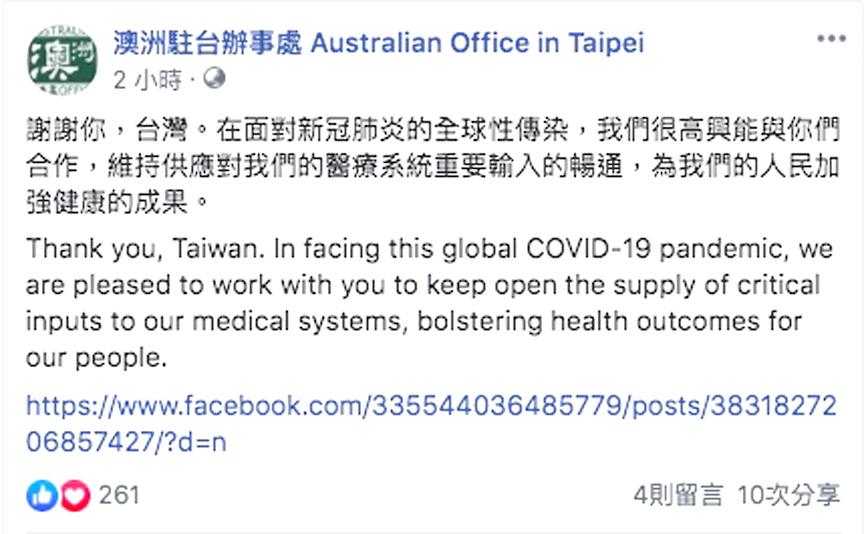Taiwan will negotiate with the WHO about its participation without Beijing’s help and intervention as more countries, including Australia and Japan, are partnering with Taiwan to curb the COVID-19 pandemic, the Ministry of Foreign Affairs said yesterday.
US Secretary of State Mike Pompeo in a telephonic roundtable with reporters on Monday also supported Taiwan’s role in the WHO, saying the US Department of State would do its best to assist Taiwan’s “appropriate role” in the world’s highest health policy setting body, Voice of America reported.
In a Japan Business Press report published on Sunday, Chinese Ambassador to Japan Kong Xuanyou (孔鉉佑) said that Beijing plans to accept Taiwan as a regular observer in the WHO and is initiating related discussions and adjustments.

Photo: Lu Yi-hsuan, Taipei Times
Asked about Kong’s remarks, ministry spokeswoman Joanne Ou (歐江安) said that Taiwan would negotiate for its participation by itself.
As Taiwan is winning wider acclaim for its achievements in containing COVID-19, the government will strive to win support from other countries to join the WHO, as well as other global organizations, she told a news briefing in Taipei.
Ou urged Beijing not to meddle with Taiwan’s negotiations with the WHO and urged the global health body to demonstrate its professionalism, instead of giving in to political considerations.
“The question of Taiwanese membership in WHO is up to WHO Member States, not WHO staff,” the global body said in a statement on Sunday, after a video of a WHO official dodging a Hong Kong reporter’s question about Taiwan’s participation went viral.
In related news, Australia is to exchange medical supplies with Taiwan, after Taiwan and the US earlier this month jointly announced that they would enhance cooperation to contain the disease.
Taiwan is to purchase 1 million liters of alcohol from Australia to produce 4.22 million bottles of sanitizers, while Australia is to purchase 3 tonnes of non-woven fabric from Taiwan to make masks, once the nation’s mask production is sufficient, the Ministry of Economic Affairs said on Facebook on Monday.
“Thank you, Taiwan. In facing this global COVID-19 pandemic, we are pleased to work with you to keep open the supply of critical inputs to our medical systems, bolstering health outcomes for our people,” the Australian Office in Taipei said on Facebook yesterday.
The foreign ministry helped negotiate the matter and is glad to see Taiwan and Australia boost their bilateral friendship through reciprocal collaboration, Ou said.
In other developments, the Taipei Economic and Cultural Center in India is working with Japanese airlines to fly Taiwanese travelers back home, after India closed its borders on Wednesday last week.
The Japanese government has arranged Delhi-Tokyo flights via Japan Airlines and All Nippon Airways from Tuesday last week to Wednesday next week to evacuate its nationals, with Japan Airlines allowing Taiwanese travelers in India to board its flights when seats are available, Ou said.
Japan Airlines said it could help Taiwanese in Tokyo book flights to Taipei, she said.

Right-wing political scientist Laura Fernandez on Sunday won Costa Rica’s presidential election by a landslide, after promising to crack down on rising violence linked to the cocaine trade. Fernandez’s nearest rival, economist Alvaro Ramos, conceded defeat as results showed the ruling party far exceeding the threshold of 40 percent needed to avoid a runoff. With 94 percent of polling stations counted, the political heir of outgoing Costa Rican President Rodrigo Chaves had captured 48.3 percent of the vote compared with Ramos’ 33.4 percent, the Supreme Electoral Tribunal said. As soon as the first results were announced, members of Fernandez’s Sovereign People’s Party

MORE RESPONSIBILITY: Draftees would be expected to fight alongside professional soldiers, likely requiring the transformation of some training brigades into combat units The armed forces are to start incorporating new conscripts into combined arms brigades this year to enhance combat readiness, the Executive Yuan’s latest policy report said. The new policy would affect Taiwanese men entering the military for their compulsory service, which was extended to one year under reforms by then-president Tsai Ing-wen (蔡英文) in 2022. The conscripts would be trained to operate machine guns, uncrewed aerial vehicles, anti-tank guided missile launchers and Stinger air defense systems, the report said, adding that the basic training would be lengthened to eight weeks. After basic training, conscripts would be sorted into infantry battalions that would take

GROWING AMBITIONS: The scale and tempo of the operations show that the Strait has become the core theater for China to expand its security interests, the report said Chinese military aircraft incursions around Taiwan have surged nearly 15-fold over the past five years, according to a report released yesterday by the Democratic Progressive Party’s (DPP) Department of China Affairs. Sorties in the Taiwan Strait were previously irregular, totaling 380 in 2020, but have since evolved into routine operations, the report showed. “This demonstrates that the Taiwan Strait has become both the starting point and testing ground for Beijing’s expansionist ambitions,” it said. Driven by military expansionism, China is systematically pursuing actions aimed at altering the regional “status quo,” the department said, adding that Taiwan represents the most critical link in China’s

‘REALLY PROUD’: Nvidia would not be possible without Taiwan, Huang said, adding that TSMC would be increasing its capacity by 100 percent Nvidia Corp CEO Jensen Huang (黃仁勳) on Saturday praised and lightly cajoled his major Taiwanese suppliers to produce more to help power strong demand for artificial intelligence (AI), capping a visit to the country of his birth, where he has been mobbed by adoring fans at every step. Speaking at an impromptu press conference in the rain outside a Taipei restaurant, where he had hosted suppliers for a “trillion-dollar dinner,” named after the market capitalization of those firms attending, Huang said this would be another good year for business. “TSMC needs to work very hard this year because I need a lot